- Home
- Kim Newman
Angels of Music Page 4
Angels of Music Read online
Page 4
The space below was dark, a pool of inky nothing. Working silently, the Persian unwound a coil of rope from his torso and made a harness for Irene. After a tug to test the line, Irene stepped into the hole and let herself fall. The Persian, anchored strongly, doled out measured lengths of rope, lowering her by increments.
Once inside, the hole above was bright as the moon, and all around was cavernous dark. Irene blinked, hoping her eyes would adjust – but the gloom was unbroken, the dark undifferentiated.
Then there was a musical roaring, as if a steam calliope were stirring, and a thousand coloured jewels lit up, dazzling her. Incandescent lamps fired and Irene found herself dangling inside what might have been the workings of a giant clock. Gears and wheels, balances and accumulators were all around, in dangerous motion, scything through the air. She had to twist on her rope to avoid being bashed by a counterweight.
Music played – mechanical, but cacophonous, assaulting her ears.
The Persian began to haul her upwards hastily, out of the potential meat-grinder, and she climbed, loops of rope dangling below her. A razor-edged wheel whirred, slicing through loose cord.
Irene was pulled up on deck. By more than two hands.
Light streamed upwards from the hole.
Men in striped jerseys caught her. Their faces were covered by metal half-masks. The Persian, scarf torn away and hood wrenched off, was held by a stranger character, one of the ten-foot toy soldiers from the ballroom, miraculously endowed with life. Its tin moustache bristled fiercely and its big wooden hands gripped like implements of torture. Slung on its back was an oversized musket with a yard-long bayonet. Stuck out of its side was a giant key. The Persian was lifted completely off his feet, crushed against the soldier’s shiny blue tunic.
‘Messieurs,’ said Irene, ‘you’re taking liberties. Get your paws off the goods if you don’t intend to buy.’
The half-masked sailors were briefly confused, and relaxed their ungallant grip on her person. Irene darted and her slick leotard slipped through the hands of her would-be captors. Like an eel, she was out of their grasp, heading towards the side of the barge. If she got over, she would have a chance. The Persian could be rescued later, if that were possible.
Something rose from the shadows and took a much faster hold.
Three swift blows to the stomach knocked the wind out of her. She doubled up in pain, and was recaptured. The sailors were less considerate about keeping hold of her now.
The thing that had struck her emerged into the light.
It was a woman – of course – wearing a costume modelled on Elizabeth of England, with a red lacquered moon-face mask and towering headdress. Dozens of pearls studded bodice and face, exciting Irene’s larcenous instincts. Getting her breath back, she sighed at such extravagance.
‘The Countess Cagliostro, I presume.’
‘Your hostess,’ said the woman. ‘Though I don’t remember putting your names on the guest list. What were they again?’
‘I’m Sparkle and he’s Slink,’ said Irene. ‘We’re desperate apache thieves. You’ve bushwhacked us properly, so do us the courtesy of summoning gendarmes and handing us over to French justice so we can start plotting our escape from Île du Diable. We accept this as an inevitable reverse of our chosen profession, sheer crookery. And there’s no need to be unpleasant about it.’
The Countess’s mask seemed to smile, its eye-slits narrowing.
She glided, on invisible feet, to the side of her toy soldier, and twisted the key as if winding a clock. Then she stood back, and the key turned as – with big, jerky motions – the soldier raised the struggling, bleeding Persian above its head, then dropped him over the side of the barge. After a long scream, there was a splash.
Irene’s heart leaped. This was not what had been planned.
The soldier stumped away from the edge of the barge, and the Countess paid attention to Irene.
‘Now that’s taken care of, let’s talk about you.’
Irene deemed it politic to swoon.
VII
‘SHE’S WITH US now,’ said Trilby.
‘Irène,’ said Christine.
‘Eh… what?’ said Irene.
Irene blinked, awake and uncomfortable. Her wrists were tied above her head, and she hung from an iron hook. To her sides dangled Trilby and Christine, similarly trussed, wearing only undergarments.
The air was warm. A fragrance swelled upwards.
‘Don’t look down, dear,’ advised Trilby.
Of course, Irene could not help herself.
Below her feet was a vat shaped like a giant-sized witch’s cauldron, heated by a bellows-fuelled furnace. Pink, molten mass bubbled angrily, smelling of paraffin and cinnamon.
‘A coat of wax does wonders for the complexion,’ said one of the men who stood below.
Irene looked up at her wrists. She could probably saw through her bonds by swinging on the hook, but then she risked a death-plunge into boiling wax.
‘Who’s your friend?’ she asked Trilby.
‘Coppélius,’ said the Irish girl.
‘Spallanzani!’ insisted the man who had spoken. ‘He’s Coppélius!’
Spallanzani was the taller of the pair. With them was the Countess, who had kept her mask but changed into male evening dress spectacularly tailored to fit her figure. She was too hippy and busty for a dancer but had a wasp waist most opera singers would envy.
‘Three pretty girls, with unusual talents,’ said the Countess. ‘Only one agency I know of in Paris lays claim to such employees. You are the Angels of Music? The creatures of… One Whose Name is Seldom Spoken. I have heard of your previous exploits. It will almost be a shame to write fin to such a feuilleton. Almost.’
Spallanzani and Coppélius laughed, unpleasantly.
‘Naturally, ladies, I should delight in attending your final performance,’ said the Countess, ‘but pressing business elsewhere summons me. I have been absent from my Summer Ball for too long. Matters there are coming to a head. My doll-makers and I are required to oversee the course of true love. A trusted servant will remain behind to supervise your fatal immersion.’
The Countess snapped her long fingers.
A small creature lurched into the circle of light. Christine and Trilby groaned.
‘Poor Cochenille,’ said the Countess. ‘He has been fearfully mistreated this evening.’
The little man’s head did not fit on properly, and several of his limbs dragged. He would not have been especially attractive at the best of times, and now he was a complete grotesque. The Countess patted his head, and withdrew, the doll-makers trailing after her.
‘They’re mannequins,’ said Trilby. ‘The brides. Poupée Gérard and the others. Automata.’
‘Clockwork,’ said Christine.
‘I guessed as much.’
‘That lump isn’t real either,’ said Trilby, nodding at Cochenille.
‘I heard that,’ he shrilled. ‘Soon you won’t be so particular. When the wax hardens, the Countess will give you to me. As toys.’
‘Toys shouldn’t have toys,’ said Christine. ‘It’s absurd.’
Cochenille manipulated a winch, unrolling chain from a drum, humming to himself.
The girls were lowered, by inches.
Christine and Trilby took deep breaths, and twisted, knees up to their chests, feet tucked against their rumps. Irene, who’d had quite enough perilous dangling for one evening, tried her best to imitate her colleagues’ tactics, straining her shoulders and back. She yelped.
Cochenille lowered them further. They could feel heat boiling off churning wax. Spits painfully dotted their bodies, forming solid specks on their garments. It seemed the advantages of hot wax for the complexion were decidedly overrated.
They were hung from hooks fixed to a bedstead-sized frame which was attached at the corners to four chains which gathered up through an iron-loop affair to wind around pulleys fixed to the factory ceiling. The more chain was extended to lower
them, the more give there was.
Irene looked up, and saw a dusty skylight and the roofs of Paris. For an instant, she thought she saw the billow of a cloak.
From somewhere, three sharp notes sounded.
Christine and Trilby threw their weight backwards, taking Irene with them, so she could see skylight and cloaked figure no more. The girls extended their legs, feet pointed like trapézistes. Their eyes were open, fixed on nothing in particular. They concentrated on becoming living pendulum weights.
It was a side-effect of the ‘music lessons’, Irene thought – the way Christine and Trilby sometimes started acting in concert like the Corsican Brothers or (and this chilled her) the mannequin dancers at the Countess’s ball. She knew her colleagues were flesh and blood, but Erik had tinkered with their minds. At times like this, she regretted not also having submitted to the special tutoring, though she usually shrunk in cold terror from the idea.
‘Stop that swinging, at once,’ shrieked Cochenille. ‘Naughty, naughty girls.’
Irene again did her best to imitate Christine and Trilby, throwing her weight in synchronisation with their trapeze act. The frame swung in a long arc, up and back, then down and forward, as if tossed on a great wave. It seemed for a moment that the girls’ feet and legs might dip agonisingly into hot wax, but their heels barely brushed the furious surface. It was fortunate that Christine and Trilby were divested of their dresses, for skirts would have trailed in the wax and anchored them in the cauldron. Irene’s leotard was close enough to a circus aerialist’s costume to be suited for this venture.
Cochenille frantically worked the winch, which was stuck.
On the next pass, the frame took the girls past the rim of the cauldron, over dizzyingly empty space. Then they crossed the deadly gulf again, higher still at the height of the swing, and were pulled back.
Irene saw what was intended.
She hoped they wouldn’t break their legs, though that would still be better than becoming a prize exhibit at the grand opening of the Musée Grévin, the waxworks which would supposedly rival London’s Madame Tussaud’s if it were ever finished.
On the next pass, as they looked down, the girls stuck out their legs, bracing themselves for a shock. Their feet slammed against the lip of the vat, which rang like a bell, and their swinging stopped. They bent at the knees and waists, but stretched out as if standing up at a forty-five degree angle, held by their chains but safe, feet planted on the hot metal, weight tipping the cauldron.
Another note sounded from nowhere.
Christine and Trilby were out of their useful trance.
All three girls complained of discomfort – strain on their muscles, searing against the soles of their feet, damage to their stockings.
Cochenille hopped in frustration. If he loosened the chain more, the girls would be able to slip their bonds. He must reverse the winch and raise them higher, dragging them over the lip of the vat.
The gnome took hold of the wheel of the winch.
‘Give it a bit of kick,’ said Trilby.
Irene strained with her thighs, putting more weight against the cauldron. The others did too.
The vat was on an axle set in housings, so wax could be poured into moulds. By inches, the girls tipped the vat with their feet. Liquid poured out of a spout-like groove in the rim.
The first pink gush splashed against the floor.
A wave broke against Cochenille’s ankles, and froze solid on cold flagstones. He was trapped.
‘Harpies of the inferno!’ he shouted.
A greater cascade fell all around him, and he became encased in it, a doll inside a statue. He tried to move, and pieces of hot wax broke free – but more was poured onto his head, setting in drapes and drips and great chunks. He was more wax than doll now, a failed golem.
‘You’ve done for me,’ he shrilled, ‘flesh and blood vipers in dolls’ shapes! You’ve…’
Cochenille’s voice shut off. The mound of wax shook and tumbled into pieces. The doll was beyond fixing this time.
Irene took her feet off the cauldron and swung upwards, hooking her legs through the frame, taking weight off her wrist bonds, which she freed and twisted apart. She climbed the chains, as feeling came back to her fingers. Monkey-like, Christine managed the same trick, leaving Trilby to take the strain of keeping the vat, now lighter for the loss of most of its contents, in pouring position. Then, in concert, Irene and Christine lifted Trilby free.
The vat clanged back on its axle.
Wax spread on the floor, solidifying.
The girls swung wildly on their frame, comparing bruises to their skin and damage to their costume. They picked deposits of wax out of each other’s hair.
‘That was horrid,’ said Christine.
‘I’ve got aches in places where I didn’t think I had places,’ said Irene.
‘We’re not out of the woods yet,’ said Trilby. ‘We’ve got to get down from here and finish the job. Some men have to learn that their brides are life-size dolls without minds.’
‘Some men might not care,’ observed Irene.
VIII
FORTUNATELY, THE MANNEQUIN factory had an extensive store of suitable costumes for their products. The trio found playroom clothes which would pass among the giant dolls and toys at the Summer Ball: Irene as a buckskinned cowgirl of the Wild West, Christine as a bold brigadier of Napoleon’s army and Trilby as a parti-coloured harlequin.
In the factory’s stable, they found a light carriage, with a pair of horses tethered and ready. Pinned to the seat was a hand-drawn map showing the best route between the factory and the barge’s mooring, signed ‘O.G.’, for Opera Ghost.
‘He thinks of everything,’ said Christine.
‘Always watches over us,’ said Trilby.
‘He might have been more help when we were about to be dunked in the boiling wax,’ said Irene.
Her colleagues looked at her, shocked.
‘Irène, Erik works best in the shadows,’ said Christine. ‘This you know.’
Irene shrugged and climbed up onto the box.
She knew now who had been up on the rooftops. She wondered about those strange, skull-piercing musical notes and their effect on her colleagues.
‘Yee-hah, giddyup,’ she shouted, taking the reins.
The vehicle charged out onto the street, knocking over a brazier at which a night-watchman had been warming his hands. Hot coals spilled on the cobbles.
The watchman made an impertinent gesture at the departing carriage.
Christine and Trilby argued over the map, feeding Irene instructions at each turn. The horses knew their way already, which Irene didn’t find all that comforting.
The Angels of Music tore through the streets of Paris.
IX
AT MIDNIGHT, THREE happy couples were escorted by creaking wooden soldiers from the ballroom of the barge into a smaller, equally well-appointed chamber where the company was far more select. Here, music was provided by intricate automata whose instruments were parts of their bodies. The orchestra had been constructed by skilled Venetian craftsmen a century earlier.
A stiff-backed, golden-faced toy conductor – a marvellous engine in itself, clad in a gold swallow-tail coat with jewel-studded epaulettes – precisely ticked off the seconds with a baton.
The Count, the Baron and the Duke each escorted a tiny dancer. Barbée, Cyndée and Annette en Lambeaux had entirely captivated their newfound fiancés with artificial charms, augmented by certain drugs administered through tiny scratches from sharp glass fingernails. Nothing was left to chance.
Each couple joined the dance, moving elegantly to the automata’s tinkling. The other couples on the floor would have been familiar to Erik’s agents, for their documents had been examined. Here was the Grand Marshal Gérard, the Duke of Omnium, the Chevalier del Gardo, Monsieur le Juge Cordier, Mr Thatcher of New York, Cardinal Tosca and all the other ‘husbands’, partnered with – and, in some cases, propped up by – deceptively f
ragile, hard-eyed wives. Indeed, a careful observer would have noticed these men were led around the floor by their painted dolls, in an advanced state of befuddlement verging on somnambulism.
At length, the dance concluded, and the couples stood in neat rows as if for inspection, male heads hung, female faces turned up. A trap slid open and a podium raised, upon which stood the masked Joséphine Balsamo, swathed in pure white furs, from arctic wolves and polar bears. She presented a savage, commanding aspect – like the chieftain of a marauding tribe clad in the skins of fallen enemies.
‘Tonight, at last, our company is complete,’ she announced. ‘The men in this room can claim between them to control the world. Every sphere of human activity is represented – politics, finance, arms, faith, letters, industry, science. Beside you are your perfect wives, so demure, so devoted. You are theirs, entirely. Through them, you are mine entirely. You serve the Cause of Cagliostro. I have played a long game. You all had to be in place. Nothing in this world cannot be decided among the men in this room. Wars can be arranged. Fortunes shifted. Governments changed. On my whim, I could choose what people will say, think, eat, hum in the bath. This has been my goal for more years than I care to remember. My sole regret is that, at this moment, I am essentially talking to myself, for you, the wives, are but my instruments, unliving tools who express only my will. And you, the husbands, are sleeping, dreaming what I have deemed you will dream, dancing at the end of strings I control. Shall I feel lonely? Is this game solitaire? Earlier tonight, it was revealed to me that forces – pathetic, perhaps, set beside this company but not to be despised – were set against me, against us. Agents have been dealt with. But there may be others. Believe me, I am glad of this. For we must test our strength. We must seek out the other players of this Great Game and destroy them utterly.’
China palms clapped together in approval.
Beneath her moon-mask, the Countess smiled on her creatures.
X
FROM THE PONT du Carrousel, Christine, Trilby and Irene watched as carriages ferried away the Countess’s lesser guests. Thus was the chorus dispensed with, ejected from the ball – only members of the exclusive Marriage Club remained on the barge with the Countess and her minions.

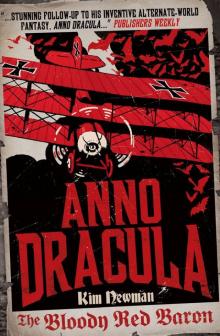 The Bloody Red Baron
The Bloody Red Baron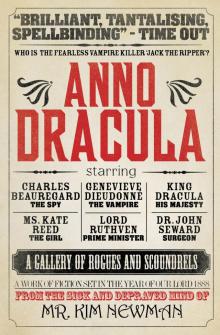 Anno Dracula
Anno Dracula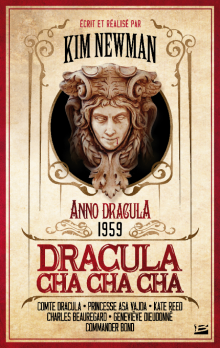 Dracula Cha Cha Cha
Dracula Cha Cha Cha Anno Dracula 1999
Anno Dracula 1999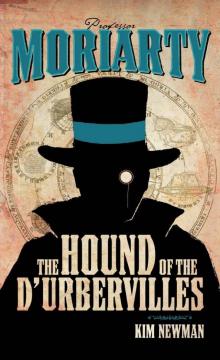 Moriarty: The Hound of the D'Urbervilles
Moriarty: The Hound of the D'Urbervilles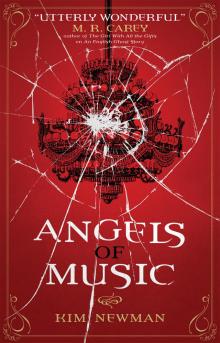 Angels of Music
Angels of Music The Man From the Diogenes Club
The Man From the Diogenes Club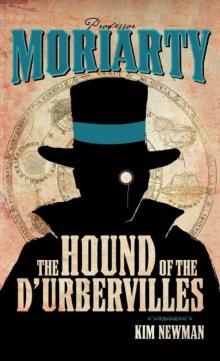 Professor Moriarty: The Hound Of The D’urbervilles
Professor Moriarty: The Hound Of The D’urbervilles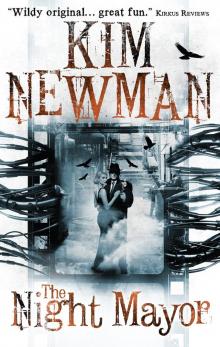 The Night Mayor
The Night Mayor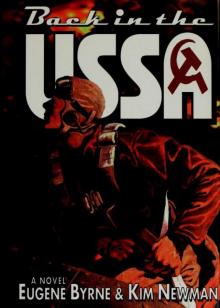 Back in the USSA
Back in the USSA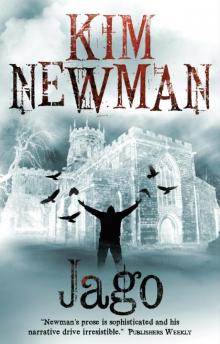 Jago
Jago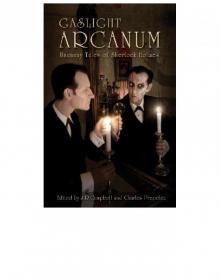 Gaslight Arcanum: Uncanny Tales of Sherlock Holmes
Gaslight Arcanum: Uncanny Tales of Sherlock Holmes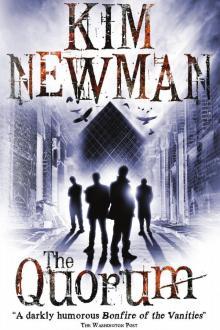 The Quorum
The Quorum Anno Dracula 1899 and Other Stories
Anno Dracula 1899 and Other Stories Life's Lottery
Life's Lottery The Secrets of Drearcliff Grange School
The Secrets of Drearcliff Grange School Anno Dracula ad-1
Anno Dracula ad-1 The Bloody Red Baron: 1918 ad-2
The Bloody Red Baron: 1918 ad-2 An English Ghost Story
An English Ghost Story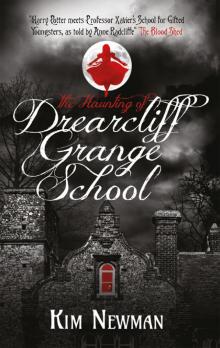 The Haunting of Drearcliff Grange School
The Haunting of Drearcliff Grange School The Other Side of Midnight
The Other Side of Midnight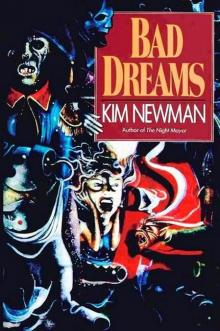 Bad Dreams
Bad Dreams Anno Dracula--One Thousand Monsters
Anno Dracula--One Thousand Monsters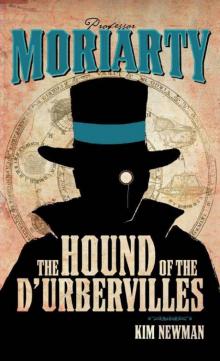 The Hound Of The D’urbervilles
The Hound Of The D’urbervilles The Bloody Red Baron: Anno Dracula 1918
The Bloody Red Baron: Anno Dracula 1918